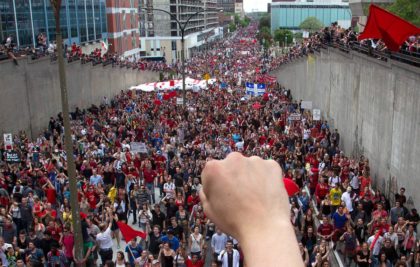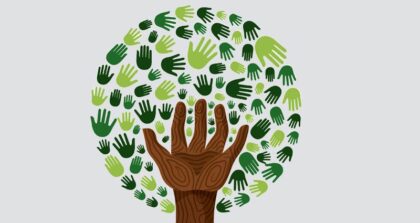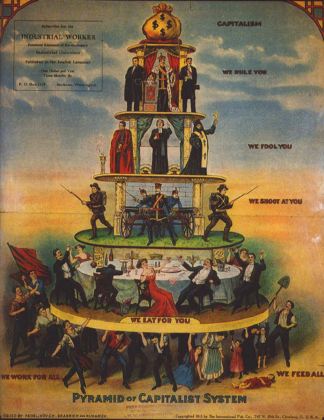
Description
Professor: Erik Chevrier
Office Hours: Before or after class (by request)
Professor’s Office: H-1125-12
Day/Time: Thursday – 2:45 – 5:30PM
E-mail: professor@erikchevrier.ca
Classroom – CI-104 SGW
This course is about taking action, resisting, creating, appropriating, and revolting. Current capitalist crises are affecting people worldwide. This course is about making a difference, fighting for social justice and create a better, more equitable world – beginning in local communities.
The goal of this course is to equip future activists, community organizers and/or social entrepreneurs with the tools to be effective in taking power, creating viable projects, and maximizing success. Students will read and discuss theoretical perspectives, explore critical debates, discuss tensions and contradictions, recognize strengths and acknowledge limitations in community organizing and local activism.
Students will be provided with practical resources, guidelines and strategies to practice in the classroom, then use in local communities. Students will also learn about the role of social organizations, local politicians, street activists, art activists, mobilizers, agitators, and social justice worriers in creating social change. A variety of local community organizers and activists will give presentations and lead discussions about their work.
Most importantly, in this course, we will form a community. Students will have the opportunity to make decisions about: how the course functions, their projects, the methods of evaluating their project, and get to choose what readings they will do from the list below. Students will be expected to read 40 pages a week, provide a summary of the readings and be able to discuss/debate the perspectives presented in the readings. Students will also take turns leading discussions, taking notes (and making them available online), creating online discussions and sharing information. They will be encouraged to bring food to share with the class, on a rotating schedule. Students are encouraged to get involved with these organisers through course projects and/or in other ways.
Students will create a project to enhance the community, fight for a social justice cause, empower marginalized communities, create social values, and/or take back the economy! Students will become community activists, organizers and researchers by performing community service-learning and critical-participatory-action-research projects. Students will also get involved in their communities by attending events, actions, discussions, and/or other relevant activities; writing a blog; and making it able to the community at large (with permission of the participant and student). Furthermore, students will interview members of community organizations and/or community activists and publish blog posts (and other media forms) about the interview. These findings may be made available on the PostCapitalistPossibilities.org website and/or in other social media designed by the students.
This syllabus will be discussed with the students in the first class to get feedback. The syllabus may be revised after the first class based on our conversation. The official syllabus will be made available at class 2 on January 16th.
Course Materials and Text:
Students will choose at least 40 – 50 pages per week from the readings below – BEFORE EACH CLASS. I encourage students to read the ‘required readings’, however I am also open to have students read some of the recommended readings and/or other relevant material if approved by me (Erik Chevrier). Before the end of each class, we will discuss which readings we will focus on for the upcoming week. Students are also expected to attend ALL classes and participate in class discussions.
The following books are available at the Coop Bookstore (www.co-opbookstore.ca) and at the library at Concordia.
Shragge, E. (2013) Activism and Social Change: Lessons for Community Organizing, 2nd edition, University of Toronto Press.
Choudry, A., Hanley, J., Shragge, E. (2012) Organize! Building from the Local for Global Justice, PM Press.
Bishop, A. (2015) Becoming an Ally; Breaking the Cycle of Oppression in People, 3rd Edition, Fernwood Publishing.
Frampton C., Kinsman, G., Thompson, A. K., Tilleczek, K. (2006), Sociology for Changing the World: Social Movements/Social Research
Whitmore, E., Wilson, M. G., Calhoun, A. (2011) Activism that Works, Fernwood Publishing
Kuyek, J. (2011) Community Organizing: A Holistic Approach, Fernwood Publishing.
Minieri, J., Klein, K., Getsos, P. (2007) Tools for Radical Democracy: How to Organize for Power in Your Community, Jossey-Bass.
The power-point lecture notes will be posted on the course site on a weekly basis before each class.
Recommended readings: If students want to read from the recommended reading list, they must acquire these readings on their own.
URLs and other electronic sources may be posted on the course website from time to time. Please visit the course website to get this material. These are only for interest and are not required.
Course Evaluation
| Assignments | Due Date | Grade Weight |
| Participation | Ongoing | 10 |
| Action Research Project Proposal | February 20th | 15 |
| Action Research Project | April 9th | 30 |
| Interview with Community Group/Local Activist | February 13th or March 19th | 15 |
| Blog Post About a Community Event/Action | February 13th or March 19th | 15 |
| Reading Summary/Seminar | TBD | 15 |
| Total | 100 |
Participation: The participation grade is based on attendance, involvement in in discussions, participation in classroom activities, supplemental tasks and completing weekly hand-written notes about the readings you completed. Students will be awarded 1 point for completing all of the above for 10 of 11 classes (with designated readings). Students are expected to attend the first and last class even though there are no readings. Students will get one point deducted if they miss the last class without a reasonable explanation. Students will get .5 of a point for a class if they attend but provide no notes, or if they submit notes but do not attend class. If the notes are not adequately done, Erik may award .5 instead of 1 point.
Action Research Project: The objective of this assignment is to give students hands on experience by participating in current social movements. Students will perform a critical-participatory-action-based research project by creating a new community initiative and/or participating with an already existing community initiative at Concordia University or in the community at large. Students will be encouraged to perform their project together as a group, however, they may choose to work on something in a group that already exists and/or create something with likeminded people outside the classroom. Students will form clusters and contribute to the project based on their area of expertise. For example, someone with great research skills could get involved with the research portion of the project, someone with media skills can build media infrastructure, someone with great interpersonal communication skills can be our mobilizer, among other tasks. Students will be evaluated based on the depth of their involvement with the project, their deliverables (which will be agreed upon in their proposal), clearly reporting their contribution to the project, an oral presentation summarizing their role in the project, and linking the project to the course material. Students will be encouraged to make partnerships with students from Erik’s Advertising and the Consumer Culture because they will be expected to produce promotional material for community organizations and local activists.
Action Research Project Proposal: Students will write a proposal for their desired contribution to the critical-participatory-action research project. In the proposal, the student must describe the project, discuss their anticipated involvement, outline deliverables that will be performed by the student, provide a clear timeline for what they will accomplish, discuss the importance of the project and link the project to course material.
Blog Posts: Students will write two blog posts of about 600 words and will be encouraged to publish them on social media.
For the blog posts students can (1) attend a conference organized by a community group or participate in an ‘action’ and write about the conference/action, (2) interview a community group, activist and/or other relevant members of the community and make the findings available on social media (with the approval of the interviewee and interviewer).
Students may also write a research report (with five sources) about a topic related to community and local activism if approved by me (Erik Chevrier).
Blog posts must critically analyze the topic in a clear, concise, informative, and interesting manner and should link the topic/conference/interview to the class readings. The blog must address an appropriate audience and make sure the information is conveyed to this audience based on their level of knowledge of the subject matter. Students with video production skills can produce a video instead of a blog, however this must also be approved by me (Erik Chevrier).
Reading Summary and Student-Led Seminar: Students will get into groups and choose a date to present a summary of the readings and facilitate a discussion. Each group must make meeting notes, notes from the discussion in class, external references and the presentation available to the class via social media. Students will be evaluated on their ability to identify the central claim or thesis of the text and articulate it in our own words, synthesize the readings in a clear, informative manner, lead a discussion about the chapter and provide examples and/or case studies that support or contradict the arguments put forth in the chapter they are presenting.
Letter Grade Equivalency
Your numerical grades will be converted to letter grades as follows:
A+ (93 – 100%) B+ (77 – 79.9%) C+ (67 – 69.9%) D+ (57– 59.9%)
A (85 – 92.9%) B (73 – 76.9%) C (63 – 66.9%) D (53 – 56.9%)
A- (80 – 84.9%) B- (70 – 72.9%) C- (60 – 62.9%) D- (50 – 52.9%)
F < 50%
Lecture Schedule: Themes and Required Readings
This is a TENTATIVE schedule and is subject to change. Be sure to consult the course website regularly to be aware of any changes.
Course schedule, Topics and Readings:
January 9th – Introduction to Community and Local Activism
Frampton C., Kinsman, G., Thompson, A. K., Tilleczek, K. (2006), Sociology for Changing the World: Social Movements/Social Research
- Glossary (pp. 27 – 38)
Bishop, A. (2015) Becoming an Ally; Breaking the Cycle of Oppression in People, 3rd Edition, Fernwood Publishing.
- Glossary (pp. 133 – 148)
- Appendix (pp. 149 – 165)
Gibson-Graham, J. K., Cameron, J., Healy, S. (2013) Take Back the Economy; An Ethical Guide for Transforming Our Communities, University of Minnesota Press.
- Chart from Page 13
January 16th and 23rd – Theoretical Perspectives and Models of Community Work
Shragge, E. (2013) Activism and Social Change: Lessons for Community Organizing, 2nd edition, University of Toronto Press.
- Chapter 1 – Theoretical Perspectives and Models of Community Work (pp. 1 – 29)
Choudry, A., Hanley, J., Shragge, E. (2012) Organize! Building from the Local for Global Justice, PM Press.
- Chapter 1 – Introduction: Organize! Looking Back, Thinking Ahead (pp. 1 – 22)
Kuyek, J. (2011) Community Organizing: A Holistic Approach
- Chapter 2 – Understanding Power Over (pp. 17 – 27)
- Chapter 3 – A Neighbourhood Rebuilds Itself (pp. 30 – 40)
- Chapter 4 – Transforming Our Culture (pp. 41 – 56)
Whitmore, E., Wilson, M. G., Calhoun, A. (2011) Activism that Works, Fernwood Publishing
- Chapter 2 – Building Success in Social Activism (pp. 11 – 28)
Recommended Readings:
Kenny, S. (2002) Tensions and Dilemmas in Community Development, New Discourse, New Trojans, Community Development Journal, 37, 4, 284-299.
Fraser, H. (2005) Four Different Approaches to Community Participation, Community Development Journal, Vol 40, 3, pp 286 – 300.
Malleson, T., Wachsmuth, D, Klein, N (2011) Whose Streets? The Toronto G20 and the Challenges of Summit Protest, Between the Lines Toronto.
Chapter 21 – What Moves us Now? Contradictions of Community (pp. 187 – 200)
Shaw, M. (2008) Community Development and the Politics of Community, Community Development Journal, 43, 1, pp. 24 – 36.
Briskin, L. (1991). Feminist practice: A new approach to evaluating feminist strategy. In J.D. Wine and J.L. Ristock (Eds.), Women and social change: Feminist activism in Canada, Lorimer, (pp. 24-40).
Albert, M. (2002) The Trajectory of Change: Activist Strategies for Social Transformation, South End Press.
January 30th – Historical Perspectives on Activism and Community Practices in Quebec
Shragge, E. (2013) Activism and Social Change: Lessons for Community Organizing, 2nd edition, University of Toronto Press.
- Chapter 2 – Getting from There to Here: Historical Development of Community Work (pp. 29 – 50)
- Chapter 3 – Legacy and Traditions of Social Action (pp. 51 – 81)
- Chapter 4 – Social Action Continues: Fighting Back in a Neo-Liberal Age (81 – 98)
Recommended Readings:
Mills, S. (2010) The Empire Within: Postcolonial Thought and Political Activism in Sixties Montreal, McGill-Queens University Press.
Kruzynski, A. (2017). L’autonomie collective en action: du Centre Social Autogéré de Pointe-Saint-Charles au Bâtiment 7, Nouvelles pratiques sociales, L’action communautaire: Quelle autonomie? Pour qui? , 29, 1, pp. 139 – 158.
Sarrasin, R., Kruzynski, A., Jeppesen, S., & Breton, É. (2016). Radicaliser l’action collective : portrait de l’option libertaire au Québec, Lien social et politiques et RIAC : un demi-siècle de débats sociaux et politiques, 75, 218 – 243.
Mendell, M. (2009) The Three Pillars of Social Economy: The Quebec Experience. In Amin, A. The Social Economy: International Perspectives on Economic Solidarity, Zed Books (pp. 176 – 207)
Graefe, P. (2001) Whose social economy? Debating New State Practices in Quebec, Critical Social Policy, 21, 1, pp. 35-58.
Graefe, P. (2002) The social economy and the state: linking ambitions with institutions in Québec, Canada, Policy & Politics, 30, 2, pp. 247 – 262.
February 6th & 13 – Power and Structural Inequality in Communities
(Required and recommended readings will be determined by the students)
Guest Speaker Bonnie Soutar (The Depot) on February 6th
Guest Speaker on February 13th – Anthony Garoufalis-Auger (Extinction Rebellion & Divest Concordia)
Bishop, A. (2015) Becoming an Ally; Breaking the Cycle of Oppression in People, 3rd Edition, Fernwood Publishing.
- Chapter 2 – Understanding Oppression: How did it Come About? (pp. 14 – 33)
- Chapter 3 – Understanding Oppression: How is it Held in Place? (pp. 35 – 43)
- Chapter 4 – Understanding Oppression: The Personal is Political (pp. 45 – 59)
- Chapter 8 – Becoming an Ally (pp. 87 – 107)
Frampton C., Kinsman, G., Thompson, A. K., Tilleczek, K. (2006), Sociology for Changing the World: Social Movements/Social Research.
- Chapter 7 – Changes of Name and Sex for Transsexuals in Quebec: Understanding the Arbitrary Nature of Institutions (Viviane Namaste; pp. 160 – 173)
- Chapter 8 – Exploring the Globalized Regime of Ruling from The Standpoint of Immigration Workers (Roxana Ng; pp. 174 – 188)
- Chapter 9 – Against Illegality: New Directions in Organizing by and With Non-Status People in Canada (Cynthia Wright; pp. 189 – 207)
- Chapter 10 – Political De-Skilling/Re-Skilling: Flying Squads and the Crisis of Working-Class Consciousness/Self-Organization (Clarice Kuhling and Alex Levant; pp. 209 – 231)
Choudry, A., Hanley, J., Shragge, E. (2012) Organize! Building from the Local for Global Justice, PM Press.
- Chapter 9 – Art for Palestine: “Renarrating” History and the Present (Rafeef Ziadah; pp. 111 – 122)
- Chapter 12 – Immigrant Worker Organizing in a Time of Crisis: Adapting to the New Realities of Class Resistance (Mostafa Henaway pp. 144 – 155)
- Chapter 14 – Making Our Space, Taking Our Place: Lessons from Migrant Women’s Organizing in Montreal (Dolores Chew; pp. 174 – 188)
- Chapter 15 – Mad Activism Enters Its Fifth Decade: Psychiatric Survivor Organizing in Toronto (David Reville and Kathryn Church; pp. 189 – 201)
- Chapter 16 – Organizing and the Boycott, Divestment, Sanctions (BDS) Strategy: The Turn to BDS in Palenstine Solidarity Politics in Montreal (Brian Aboud; pp. 202 – 215)
- Chapter 19 – Moving Beyond a Politics of Solidarity Towards a Practice of Decolonization (Harsha Walia; pp. 240 – 253)
- Chapter 20 – Organizing in Solidarity with “Threats to National Security”: The Campaign Against Immigration “Security Certificates” (Mary Foster; pp. 254 – 265)
Shragge, E. (2013) Activism and Social Change: Lessons for Community Organizing, 2nd edition, University of Toronto Press.
- Chapter 6 – Conclusion: Fighting the Good Fight – The Immigrant Workers Centre (pp. 135 – 160)
Ravensbergen, F. VanderPlatt, M. (2010) Barriers to Citizen Participation: The Missing Voices of People Living with Low Income, Community Development Journal, 45, 4, pp. 389-403.
Toomey, A. H., (2011) Empowering and Disempowering in Community Development Practice: Eight Roles Practitioners Play, Community Development Journal, 46, 2, pp. 181 – 195.
Joseph, B., Joseph, C. F. (2019) Indigenous Relations: Insights, Tips & Suggestions to Make Reconciliation a Reality, Indigenous Relations Press.
Manuel, A., Derrickson, Grand Chief, R, Klein, N. (2018) The Reconciliation Manifesto: Recovering the Land, Rebuilding the Economy, Lorimer.
Mackey, E. (2016) Unsettled Expectations: Uncertainty, Land and Settler Decolonization, Fernwood Publishing.
February 20 – Creating Community: A Practical Process
Guest Speakers – Marlo Richie Turner (Head and Hands/NDG Art Hive) & Loralie Bromby (Youth Jamaican Media Lab/ African Canadian Development and Prevention Network/Coco/ J.W. McConnell Family Foundation)
Kuyek, J. (2011) Community Organizing: A Holistic Approach
- Chapter 5 – Working Together (pp. 58 – 64)
- Chapter 6 – Understanding Groups and Organizations (pp. 65 – 77)
- Chapter 7 – Making Meetings Work (pp. 78 – 82)
Choudry, A., Hanley, J., Shragge, E. (2012) Organize! Building from the Local for Global Justice, PM Press.
- Chapter 4 – Fundraising Politics and Strategy (Anne Petermann; pp. 46 – 55)
Whitmore, E., Wilson, M. G., Calhoun, A. (2011) Activism that Works, Fernwood Publishing
- Chapter 9 – Social Justice Committee: Success in Recruiting and Retaining Volunteers (pp. 113 – 123)
Recommended Readings:
Minieri, J., Klein, K., Getsos, P. (2007) Tools for Radical Democracy: How to Organize for Power in Your Community, Jossey-Bass.
Seeds for Change (2013). A Consensus Handbook: Co-operative decision-making for activists, co-ops and communities. Seeds for Change Lancaster Co-operative Ltd. On-line: https://www.seedsforchange.org.uk/resources.
March 5th – Action Research and Community Organizing
Choudry, A., Hanley, J., Shragge, E. (2012) Organize! Building from the Local for Global Justice, PM Press.
- Chapter 2 – Activist Research: Mapping Power Relations, Informing Struggles (pp. 23 – 35)
- Chapter 3 – Research Partnerships and Local Community Organizing: Reflections by Evelyn Calugay (pp. 36 – 45)
Frampton C., Kinsman, G., Thompson, A. K., Tilleczek, K. (2006), Sociology for Changing the World: Social Movements/Social Research
- Chapter 1 – Political Activist as Ethnographer (George Smith; pp. 44 – 70)
- Chapter 3 – Research for Activism: Understanding Social Organization from the Inside (Marie Campbell; pp. 87 – 98)
- Chapter 12 – Afterword: New Directions for Activist Research (pp. 246 – 271)
Recommended Readings:
Kemmis, S., McTaggart, R., Nixon, R. (2014) The Action Research Planner: Doing Critical Participatory Action Research, Springer.
Chevalier, J. M., & Buckles, D. J. (2013) Participatory Action Research: Theory and Methods for Engaged Inquiry, Routledge.
Hacker, K. (2013) Community Based Participatory Research, Sage.
Lawson, H. A., Caringi, L. P., Jurkowski, J. M., Bozlak. C. T. (2015) Participatory Action Research, Oxford University Press.
McNiff, J. (2013) Action Research: Principles and Practice, Routledge.
March 12th – Building a Movement
Choudry, A., Hanley, J., Shragge, E. (2012) Organize! Building from the Local for Global Justice, PM Press.
- Chapter 7 – Escape, Retreat, Revolt: Queer People of Colour Living in Montreal Using Photovoice as a Tool for Community Organizing (Edward Ou Jin Lee, pp. 82 – 95)
- Chapter 8 – Listen to the Music: Work the Music, Organize the Community (Normand Nawrocki; pp. 96 – 110)
- Chapter 22 – Building Power Beyond the Grassroots: ACORN Matters (Robert Fisher; pp. 278 – 290).
Alinsky, S. D. (1972) Rules for Radicals: A Pragmatic Primer for Realistic Radicals
- Chapter 2 – Of Means and Ends (pp. 24 – 47)
- Chapter 7 – Tactics (pp. 125 – 164)
Frampton C., Kinsman, G., Thompson, A. K., Tilleczek, K. (2006), Sociology for Changing the World: Social Movements/Social Research.
- Chapter 4 – Direct Action, Pedagogy of the Oppressed (A.K. Thompson; pp. 99 – 118)
Recommended Readings:
Malleson, T., Wachsmuth, D, Klein, N (2011) Whose Streets? The Toronto G20 and the Challenges of Summit Protest, Between the Lines Toronto.
- Chapter 1 – Building a Protest Convergence, The Toronto Community Convergence Network (Tom Malleson; pp. 17 – 28)
- Chapter 2 – Community Organizing for a Global Protest (Mac Scott; 29 – 34)
- Chapter 3 – Collective Movement, Collective Power: People of Colour, Migrant Justice and the G20 (Syed Hussan; pp. 35 – 42).
- Chapter 19 – Forms of Protest Reflect Our Power: Radical Strategy and Mass Mobilization (pp. 165 – 176).
March 19th – New Economic Possibilities!
Kuyek, J. (2011) Community Organizing: A Holistic Approach
- Chapter 9 – Managing the Household (pp. 90 – 101)
- Chapter 10 – Looking After Our Physical Needs (pp. 102 – 112)
- Chapter 11 – Our Working Lives (pp. 113 – 121)
Roelvink, G., Martin, K. S., and Gibson-Graham, J. K. (2015) Making Other Worlds Possible: Performing Diverse Economies, University of Minnesota Press.
- Introduction – An Economic Politics for Our Times (pp. 1 – 26)
Recommended Readings:
Olin Wright, E. (2010) Envisioning Real Utopias, Verso
De Angelis, M. (2007) The Beginning of History, Value Struggles and Global Capital.
De Angelis, M. (2003) Reflections on Alternatives, Commons and Communities, or, Building a New World from the Bottom Up,” The Commoner, No. 6, http://www.commoner.org.uk/deangelis06.pdf
De Angelis, M. (2014) Social Revolution and the Commons.” South Atlantic Quarterly, 113 (2), pp 299 – 311.
Miller, E. (2015) Anticapitalism or Postcapitalism? Both!, Rethinking Marxism, 27: 3, pp. 364 – 367.
Miller, E. (2010) Solidarity Economy: Key Concepts and Issues, In Solidarity Economy 1: Building Alternatives for People and Planet.
Gibson-Graham, J.K. (2006) Chapter 5: Surplus Possibilities: The Intentional Economy of Mondragón” in Postcapitalist Politics, Minnesota, http://www.spacesofcommoning.net/wp-content/uploads/2014/05/GIBSON_GRAHAM_Postcapitalist_Politics.pdf
Shutt, Harry (2010). Beyond the Profit System. Possibilities for a Post-Capitalist Era, Zed Books
Restakis, John (2010). Humanizing the Economy. New Society Publishers.
Polanyi, K. (2001) The Great Transformation; The Political and Economic Origins of Our Time, Beacon Press
- Chapter 4 – Societies and Economic Systems
- Chapter 5 – The evolution of the Market Pattern
Pearce, J. (2009) Social Economy: Engaging as a third system. In, Ash Amin, (2009) The Social Economy: International Perspectives on Economic Solidarity. Page 22 – 34.
Wolff, R. (2012) Democracy at Work: A Cure for Capitalism, Haymarket Books.
Albert, M. (2003) Parecon: Life After Capitalism Participatory Economics, Verso.
Dyer-Witheford, N, (2006) Species-Being and the New Commonism: Notes on an Interrupted Cycle of Struggles, The Commoner, No.11 http://www.commoner.org.uk/index.php?p=24
Pierre-Joseph Proudhon – What is Property? (Chapter 2 and 5)
http://www.marxists.org/reference/subject/economics/proudhon/property/
March 26th and April 2nd – Lessons and Possibilities in Community Organizing and Activism
Shragge, E. (2013) Activism and Social Change: Lessons for Community Organizing, 2nd edition, University of Toronto Press.
- Chapter 5 – Community as a Containment or New Possibilities (pp. 99 – 134)
Whitmore, E., Wilson, M. G., Calhoun, A. (2011) Activism that Works, Fernwood Publishing
- Chapter 11 – Activism That Works: Emergent Themes (pp. 133 – 152)
- Chapter 12 – Sense Making: Lessons from Success Stories (pp. 153 – 161)
Kuyek, J. (2011) Community Organizing: A Holistic Approach
- Chapter 12 – Paying the Bills for Social Change (pp. 122 – 135)
Choudry, A., Hanley, J., Shragge, E. (2012) Organize! Building from the Local for Global Justice, PM Press.
- Chapter 6 – Rights, Action, Change: Organize for What? (Radha D’Souza; pp. 71 – 81)
- Chapter 11 – Solidarity, Real and Imagined: Lessons from the 1991 Postal Strike (David Bleakney and Abdi Hagi Yusef; pp. 132 – 143)
Choudry, A., Shragge, E. (2011) Disciplining Dissent: NGOs and Community Organizations, Globalizations, 8, 4, pp. 503 – 517)
Recommended Readings:
Hamel, S. (2013) When Theatre of the Oppressed Becomes Theatre of the Oppressor, Research in Drama Education: The Journal of Applied Theatre and Performance, 18, 4, pp. 403-416.
Webber, V. (2018) ‘‘I’m Not Gonna Run Around and Put a Condom on Every Dick I See’’: Tensions in Safer Sex Activism Among Queer Communities in Montreal, Quebec, Sexuality & Culture, 22, 758 – 777.
April 9th – Presentations and Wrap Up
Late assignment policy:
Unless you are given permission in advance, late assignments will not be accepted without adequate documentation of medical or personal emergencies.
Handing in Assignments:
All assignments MUST be submitted in hard copy at the beginning of class on the due date. Any assignment submitted electronically will be subject to a reduction of 10% of the value of the assignment.
A list of Student Services and Useful Resources
Counselling and Psychological Services: http://concordia.ca/students/counselling-life-skills
Concordia Library Citation and Style Guides: http://library.concordia.ca/help/howto/citations
Student Success Centre: http://concordia.ca/students/success
Health Services: http://concordia.ca/students/health
Financial Aid and Awards: http://concordia.ca/offices/faao
HOJO (Off Campus Housing and Job Bank): http://csu.qc.ca/hojo
Academic Integrity: http://concordia.ca/students/academic-integrity
Access Centre for Students with Disabilities: http://concordia.ca/offices/acsd
CSU Advocacy Centre: http://csu.qc.ca/advocacy
Dean of Students Office: http://concordia.ca/offices/dean-students
International Students Office: http://concordia.ca/students/international
Student Hub: http://concordia.ca/students
Sexual Assault Resource Centre: http://concordia.ca/students/sexual-assault.html
Indigenous Directions: http://concordia.ca/about/indigenous.html
University Rights and Responsibilities
Academic Integrity: “The Academic Code of Conduct sets out for students, instructors and administrators both the process and the expectations involved when a charge of academic misconduct occurs. The regulations are presented within the context of an academic community which seeks to support student learning at Concordia University.” (From Article 1 of the Academic Code of Conduct). Full text:
http://www.concordia.ca/students/academic-integrity/offences.html
Plagiarism: The most common offense under the Academic Code of Conduct is plagiarism, which the Code defines as “the presentation of the work of another person as one’s own or without proper acknowledgement.” This includes material copied word for word from books, journals, Internet sites, professor’s course notes, etc. It refers to material that is paraphrased but closely resembles the original source. It also includes for example the work of a fellow student, an answer on a quiz, data for a lab report, a paper or assignment completed by another student. It might be a paper purchased from any source. Plagiarism does not refer to words alone –it can refer to copying images, graphs, tables and ideas. “Presentation” is not limited to written work. It includes oral presentations, computer assignment and artistic works. Finally, if you translate the work of another person into any other language and do not cite the source, this is also plagiarism. In Simple Words: Do not copy, paraphrase or translate anything from anywhere without saying where you obtained it! Source: Academic Integrity Website: http://concordia.ca/students/academic-integrity
Disabilities: The University’s commitment to providing equal educational opportunities to all students includes students with disabilities. To demonstrate full respect for the academic capacities and potential of students with disabilities, the University seeks to remove attitudinal and physical barriers that may hinder or prevent qualified students with disabilities from participating fully in University life. Please see the instructor during the first class if you feel you require assistance.
For more information please visit http://concordia.ca/offices/acsd
Safe Space Classroom: Concordia classrooms are considered ‘safe space classrooms’. In order to create a climate for open and honest dialogue and to encourage the broadest range of viewpoints, it is important for class participants to treat each other with respect. Name-calling, accusations, verbal attacks, sarcasm, and other negative exchanges are counter-productive to successful teaching and learning. The purpose of class discussions is to generate greater understanding about different topics. The expression of the broadest range of ideas, including dissenting views, helps to accomplish this goal. However, in expressing viewpoints, students should try to raise questions and comments in ways that will promote learning, rather than defensiveness and feelings of conflict in other students. Thus, questions and comments should be asked or stated in such a way that will promote greater insight into the awareness of topics as opposed to anger and conflict. The purpose of dialogue and discussion is not to reach a consensus, nor to convince each other of different viewpoints. Rather, the purpose of dialogue in the classroom is to reach higher levels of learning by examining different viewpoints and opinions with respect and civility.
I acknowledge that Concordia University is located on unceded Indigenous lands. The Kanien’kehá:ka Nation is recognized as the custodians of the lands and waters on which we gather today. Tiohtiá:ke/Montreal is historically known as a gathering place for many First Nations. Today, it is home to a diverse population of Indigenous and other peoples. We respect the continued connections with the past, present and future in our ongoing relationships with Indigenous and other peoples within the Montreal community. (Indigenous Directions Leadership Group, Feb. 16, 2017)




